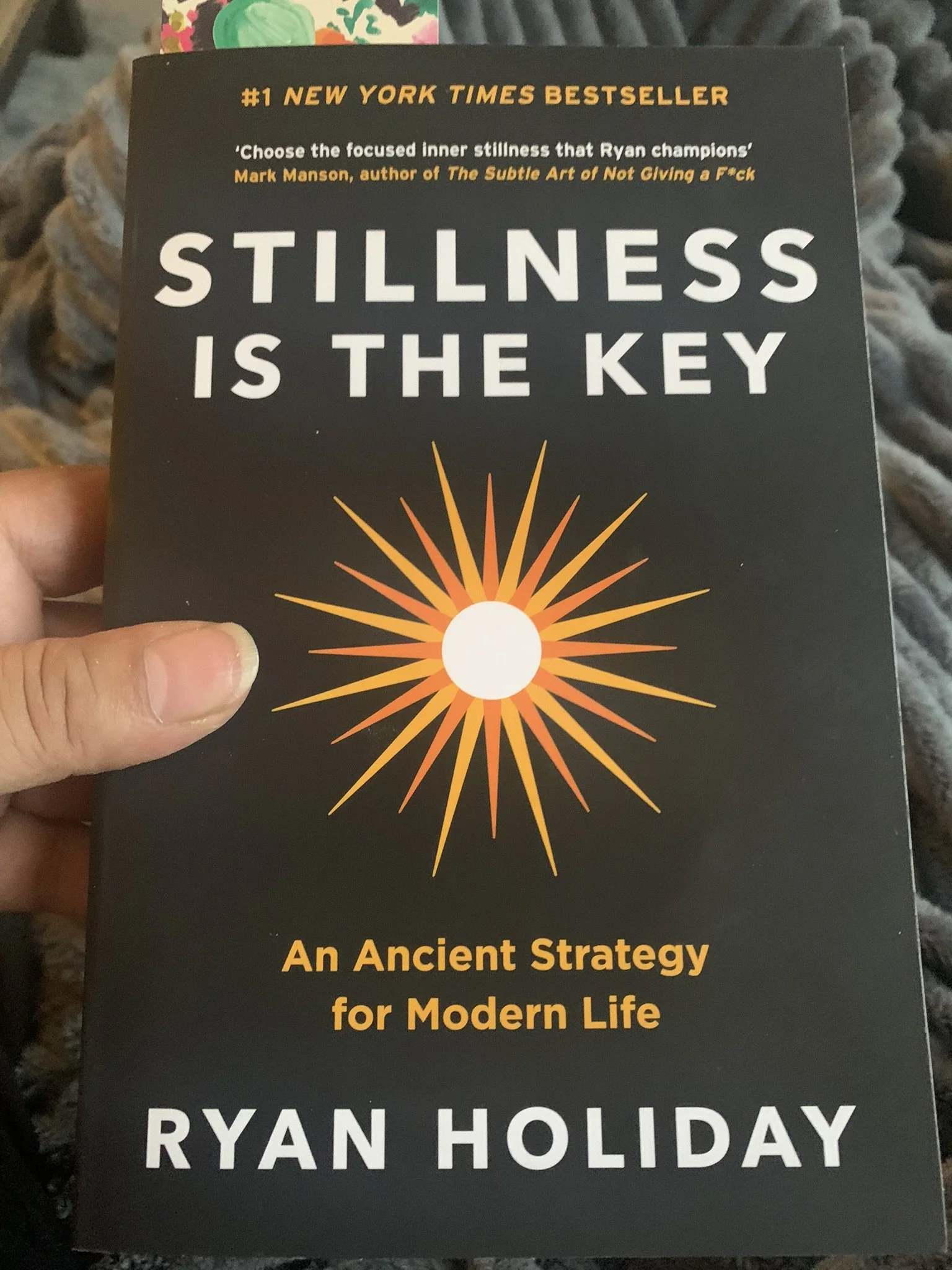Stillness is the Key by Ryan Holiday
Introduction
This book is written by Ryan Holiday who is a thinker in the realm of stoicism and personal development. I first came across his work on YouTube – check out his channel, it has some great content. Holiday predominantly explores his topic areas aligned with philosophy and aligns the thinking to modern life.
Summary
This book explores the concept of stillness and how we have lost the ability to appreciate stillness as we live in a world that never sleeps. Holiday foundations are aligned with the stoic philosophy that stillness is essential in our chaotic and noisy world to enhance our strength, focus, and wisdom. He also delves into Eastern spirituality and historical and modern anecdotes.
Structure and Chapters
The book comprises three main sections: mind, spirit, and body. Each of these sections explores how stillness can be applied to different parts of our lives, for example, our thoughts, emotions, and physical well-being.
Part 1 – Mind
Is a deep dive into the intricate workings of the mind and explores how cultivating stillness at this mental level is foundational for a balanced and meaningful life. The section begins with an insightful introduction that underscores the necessity of stillness in a world inundated with noise and distractions. As Holiday navigates the domain of the mind, he looks at the dual nature of the mind—acting as both a source of stillness and a potential wellspring of turbulence.
Readers are guided through chapters like, Become Present, Empty the Mind, Slow Down, Think Deeply, and Start Journaling, to help understand the role of mindfulness, focus, and purpose in attaining a still mental state.
Part 2 – Spirit
Here, Holiday explores spirituality and its connection to achieving stillness. The section begins with an introduction highlighting obstacles to stillness and then delves into the domain of the spirit, examining virtues, gratitude, and presence. Chapters include; Domain of the Soul, Heal the Inner Child, Accept a Higher Power, and Conquer Your Anger, to guide readers toward aligning their spirits with values and purposes for a deeper sense of tranquillity.
Part 3 – Body
In this section of the book, Holiday shifts focus to the physical aspect of stillness and its impact on mental and spiritual well-being. Beginning with an introduction that underscores the role of the body in achieving stillness, the section explores the practices and disciplines related to physical tranquillity. Chapters include: Say No, Take a Walk, Build a Routine, Get Rid of Your Stuff, and Seek Solitude, to understand the significance of activities such as exercise, rest, and overall physical health in the pursuit of stillness.
What resonated?
“Buddhism, Stoicism, Epicureanism, Christianity, Hinduism. It’s all but impossible to find a philosophical school or religion that does not venerate this inner peace – this stillness – as the highest good and as the key to elite performance and a happy life. And when basically, all the wisdom of the ancient world agrees on something, only a fool would decline to listen.”
The above paragraph in the preface of the book summed up the book for me. The three sections are each full of excellent learning and insights. The book is so good, it is really difficult to pick out what succinctly resonated with me. Paragraph after paragraph was full of the most amazing information and anecdotes as an antidote to modern life.
Having recently taken a new approach to my daily walking, which is to fully submerge myself into the experience, taking in the sights, sounds and smells around me, the chapter entitled ‘Take a walk’ was wonderful. Here is a little snippet:
“How does walking get us closer to stillness? Isn’t the whole point of what we’re talking about to reduce activity, not seek it out? Yes, we are in motion when we walk, but it is not frenzied motions or even conscious motion – it is repetitive, ritualised motion. It is deliberate. It is an exercise in peace.”
The act of walking is not about getting in those 10,000 steps or improving your fitness (that is something separate) – this type of walking is a connection with nature and also oneself.
Some of My Favourite Quotes
All greatness comes from loss. All change begins with the selfless act of giving. All mastery is based on love.
The most important knowledge is self-knowledge
Our mind is affected by the pace of our lives, our culture, and our era. It’s not as if this culture invented distraction. It’s not as if these problems are new. But they are distinctly ours.
No matter what you’re going through, there’s a space inside you that you can go to where you’re still.
Real strength lies in the control or, as Nassim Taleb put it, the domestication of one’s emotions, not in pretending they don’t exist.
The ability to deliberately keep yourself in check, even in moments of chaos and high-pressure situations, is stillness.
The mind must be given relaxation; it will rise improved and sharper after a good break. Just as rich fields must not be forced, for they will quickly lose their fertility if never given a break, so constant work on the anvil will fracture the force of the mind.
The future isn’t guaranteed, and the past doesn’t have to predict the future.
Conclusion
The book is structured very well and very easy to follow, allowing the reader to focus on each aspect of each section of the book at a time and embed the main principles into everyday life.
I have to say I love, love, love this book and would recommend it to anyone who feels overworked, stressed out by modern life, on the brink of burnout, or for those who just want to reinforce a lifestyle they already aspire to.
A true gift of a book into the world. Thank you Ryan Holiday.
As an Amazon Associate, I earn from qualifying purchases.
Buy on amazon.co.uk (affiliate link) - https://amzn.to/4q0sxV0


